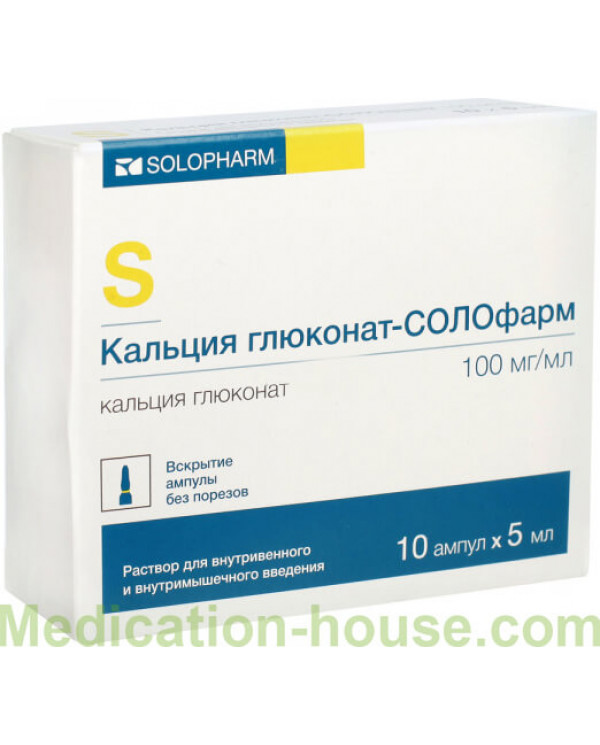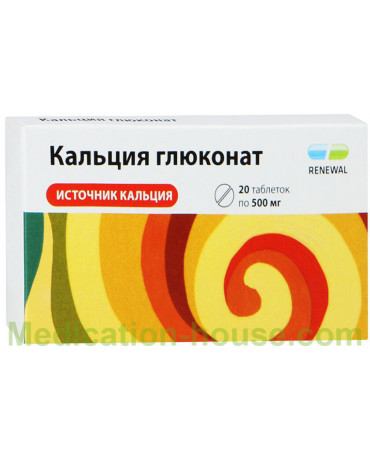Calcium Gluconate injections user manual
You can buy Calcium Gluconate injections on this page
Release form and composition
Solution for parenteral administration. Calcium gluconate injections is a colorless transparent liquid. The main active ingredient of the drug is calcium gluconate injections, its content in 10 ml of solution is 1 g (10% solution). The solution is in a sealed glass ampoule of white glass with a volume of 10 ml. The cardboard pack contains 10 ampoules with a solution and instructions for use of the drug.
pharmachologic effect
Calcium is a trace element that participates in the normal course of many physiological processes in the human body. In particular, calcium ions are involved in the transmission of nerve impulses in the structures of the nervous system, neuromuscular synapses. Calcium is also one of the main compounds that are necessary for normal blood coagulation. After parenteral administration of the drug, it quickly accumulates in the blood, is almost evenly distributed in all tissues and is included in the mineral metabolism.
Indications for use
Parenteral administration of Calcium gluconate solution is indicated for certain pathological conditions accompanied by a decrease in the level of calcium ions in the blood, as well as for the normal course of physiological processes that require the participation of this microcell. These indications include:
Hypocalcemia of different origin - a decrease in the level of calcium ions in the body below the norm.
Hypoparathyroidism is an insufficient functional activity of the parathyroid glands, which leads to a significant decrease in the level of calcium in the body.
Parenchymal hepatitis (inflammation of the organ parenchyma) and toxic liver damage.
Nephritis (inflammation of the kidneys), which increases the excretion of calcium ions in the urine.
Combined therapy of inflammatory processes of various origin and localization, which are accompanied by pronounced exudation (effusion of blood plasma into the intercellular substance of the tissues due to the inflammatory increase in the permeability of the vascular walls).
Treatment of allergic reactions with concurrent use of antihistamine (antiallergic) drugs.
As an additional hemostatic agent in the treatment of gastrointestinal, pulmonary, nasal, uterine bleeding in women.
Also, the solution for parenteral administration is indicated as an antidote for poisoning with magnesium salts, oxalic acid and its salts with oxalates.
Contraindications
The use of the solution for parenteral administration of calcium gluconate is contraindicated in hypercalcemia (increased levels of calcium ions in the blood and body), hypercalciuria (intensive increased excretion of calcium ions by the kidneys in the urine), severe renal failure with a pronounced decrease in renal function, tendency to thrombosis (intravascular formation of blood clots ). Also, the drug is contraindicated in the presence of individual intolerance to calcium gluconate.
Dosage and administration
The solution for parenteral administration of calcium gluconate is administered intramuscularly or intravenously. The introduction itself is carried out slowly, within 2-3 minutes. Immediately before using the drug, the ampoules with Calcium Gluconate solution must be heated to body temperature (up to + 37 ° С). The average dosage for adults is 5-10 ml of solution 1 time per day every day or 1 time per 2-3 days. For children, the drug is administered in the amount of 1-5 ml of solution every 2-3 days. Intramuscular administration of the drug is not recommended for children, which is associated with a higher risk of developing necrosis (death) of muscles in the injection area. The doctor determines the dosage, mode and duration of the course of use of the drug individually, depending on the age, sex, weight of the patient, as well as the severity and nature of the pathological process.
Side effects
Parenteral administration of Calcium Gluconate solution can lead to the development of several side effects and undesirable reactions, which include:
Nausea, with occasional vomiting, diarrhea (diarrhea).
Bradycardia - reducing the frequency of heart contractions.
In the area of solution injection, a local irritation reaction may develop in the form of reddening of the skin, its swelling and the appearance of pain. Rarely (especially in children) muscle necrosis is possible with intramuscular administration of the drug.
In the case of the development of side effects, the use of the solution for parenteral administration of calcium gluconate injections is stopped.
special instructions
Before starting to use the drug, you should make sure that there are no contraindications to its use, you should also pay attention to a few special instructions, which include:
During the use of the drug, it is necessary to strictly follow the rules of asepsis to prevent infection of the injection area.
Intramuscular administration of the drug to children is excluded.
The solution for parenteral administration is used with caution in pregnant and lactating women, as well as in persons with the presence of concomitant renal failure of mild and moderate severity.
With a small concomitant hypercalciuria, it is recommended to conduct periodic monitoring of the electrolyte state of the blood.
The presence of urolithiasis serves as the basis for periodic monitoring of the level of calcium ion excretion in the urine during drug administration.
The simultaneous use of Calcium Gluconate injectable solution with drugs of other pharmacological groups can lead to drug interactions, in particular, it reduces the activity of calcium channel blockers (verapamil and analogs).
There is no data on the direct effect of the drug on the functional activity of the cerebral cortex and other structures of the central nervous system.
In the pharmacy network, Calcium Gluconate injection solution is released by prescription. Its introduction to persons without medical education is not allowed due to the high risk of complications, in particular, infection of the injection site.
Overdose
With a significant excess of the recommended therapeutic dose develop signs of hypercalcemia, which include anorexia (lack of appetite), polyuria (increased output of urine), arrhythmia (arrhythmia and heart rate), nausea, periodic vomiting and diarrhea. In this case, symptomatic therapy is carried out.
Terms and conditions of storage
The shelf life of the solution for parenteral administration of Calcium gluconate injections is 2.5 years from the time of its manufacture. The preparation should be stored in a place inaccessible to children at air temperature not higher than + 25 ° С, the solution should not be frozen. After opening the vial, the drug should be used immediately.
Terms of sell
You don't need a prescription to buy Calcium Gluconate injections.


